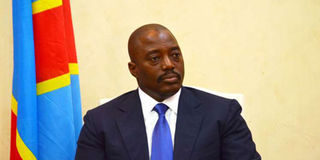Joseph Kabila’s time is over

The Democratic Republic of Congo's President Joseph Kabila in the country's capital Kinshasa. PHOTO | TUTONDELE MIANKENDA | AFP
What you need to know:
- The Democratic Republic of Congo has not known stability since the days of Belgian King Leopold.
Any leader who plans to continue such a situation is worth nothing.
Joseph Kabila qualifies.
Despite warnings of potentially disastrous results of political unrest escalating out of control, President Joseph Kabila of the Democratic Republic of Congo remains in the league of “they shall have eyes and not see; ears and not hear”.
The United States gave the clearest one yet. It ordered its employees’ families to start leaving on Thursday and halted most visits by officials due to “deteriorating security situation”.
This follows weeks of demonstration by citizens opposed to the postponement of presidential elections scheduled for next month but now pushed to 2017. The unrest culminated into clashes between police and demonstrators two weeks ago. At least 50 people died.
In a statement, the United States, the African Union and the United Nations urged a peaceful settlement of the crisis that began in January last year. Evidence Kabila payed heed remains non-existent.
Opposition parties and myriad critics see ploys he intends to stay in office. That, they argue’ is unacceptable. The constitution limits to two five-year consecutive presidential terms. Kabila’s end December 19, 2016. In any case, even a leap year, remains a year.
Since he first mooted the idea of an extended stay in office by fiddling with elections laws leading to demonstrations in January 2015, Kabila has unleashed security agencies on opponents of his designs.
REPORT SAYS
On that, the Human Rights Watch current report says “…government officials and security forces have arbitrarily arrested scores of activists and opposition leaders, some of whom were held incommunicado for weeks or months while others were put on trial on trumped-up charges”. Gory details follow.
Kabila, 45, and in power by default beginning 2001 – he later won two discredited elections – takes solace in the Constitutional Court’s ruling in May saying he can continue in office if elections aren’t held. There’s also an interim government deal he recently made with minor political parties. It would govern until elections are held mid-next year, him presiding, a non-starter. The president’s supporters plead financial constraints and out of date voters register.
Governments proclaiming to be democratic are obliged ensure voters are registered and elections held as provide by law. Failure to do so amounts to sabotaging the democratic process. “Oh, this and that” isn’t an option.
Ironically, the out-of-date voters register necessitates the postponement. Estimates are the current one covers half the 45 million eligible voters.
Kabila’s time isn’t only over.
He has also bungled the job by engineering situations in the political process to suit his ambitions.
What’s now DRC hasn’t known stability since the days of Belgian King Leopold – 1870.
Any leader who plans to continue such a situation is worth precious nothing. Kabila qualifies.




